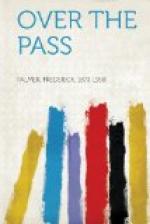“Why, yes. I told you at the start it was all most preposterous,” she answered.
“And he was not afraid of death—this Wingfield!” Jasper repeated.
He was looking away from her. The contraction of his brows had become a scowl of mystification.
“Why do you always speak of him as ‘this Wingfield,’” she demanded, “as if the town were full of Wingfields and he was a particular one?”
He looked around quickly, his features working in a kind of confusion. Then he smiled.
“I was thinking of the whistle,” he explained. “Well, we’ll call him this Sir Chaps, this Senor Don’t Care, or whatever you please. As for his walking into the gun, there is nothing remarkable in that. You draw on a man. You expect him to throw up his hands or reach for his gun. He does nothing but smile right along the level of the sight into your eyes. It was disturbing to Pete’s sense of etiquette on such occasions. It threw him off. There are similar instances in history. A soldier once put a musket at Bonaparte’s head. Some of Caesar’s legionaries once pressed their swords at his breast. Such old hands in human psychology had the presence of mind to smile. And the history of the West is full of examples which have not been recorded. Go on, Mary!”
“Ignacio says he has a devil in him,” she added.
“That little Indian has a lot of primitive race wisdom. Probably he is right,” her father said soberly.
“It explains what followed,” she proceeded.
She was emphatic about the reason for her part. She went out to the arroyo on behalf of her responsibility for a human life.
“But why did you not rouse me? Why did you go alone?” he asked.
“I didn’t think—there wasn’t time—I was upset and hurried.”
She proceeded in a forced monotone which seemed to allow her hardly a single full breath.
“And I am going to kill you!” she repeated, shuddering, at the close of the narrative.
“When he said that did his face change completely? Did it seem like the face of another man? Yes, did it seem as if there were one face that could charm and another that could kill?” Jasper’s words came slowly and with a drawn exactness. They formed the inquiry of one who expected corroboration of an impression.
“Yes.”
“You felt it—you felt it very definitely, Mary?”
“Yes.”
She was living over the moment of Jack’s transformation from silk to steel. The scene in the arroyo became burning clear. Under the strain of the suppression of her own excitement, concentrated in her purpose to make all the realism of the duel an absurdity, she did not watch keenly for the signs of expression by which she usually knew what was passing in her father’s mind. But she was not too preoccupied to see that he was relieved over her assent that there was a devil in Jack Wingfield, which struck her as a puzzle in keeping with all that morning’s experience. It added to the inward demoralization which had suddenly dammed her power of speech.




